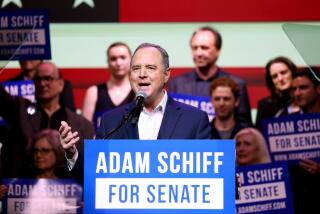Searching for brave Republicans
Much has been opined about taxes over the generations, but my favorite still is the observation of Oliver Wendell Holmes: “Taxes are what we pay for civilized society.”
The Supreme Court justice’s law clerk supposedly responded: “I’ve got about as much civilized society as I can afford.” But that may be apocryphal.
Gov. Ronald Reagan, in 1967, boldly told the grass-roots California Republican Assembly that he was raising taxes by a record amount and most voters supported him “because they see the need to balance the budget.”
The conservative icon admonished the party activists: “We cannot offer [voters] a narrow sectarian party in which all must swear allegiance to prescribed commandments. Such a party can be highly disciplined, but it does not win elections.
“This kind of party soon disappears in a blaze of glorious defeat, and it never puts into practice its basic tenets, no matter how noble they may be.”
The California GOP, in recent years, has been proving Reagan right.
Gov. Pete Wilson was not exactly eloquent but he was plenty articulate in 1991 when he angrily warned Republican legislators during a private caucus that if they refused to consider a tax increase in budget negotiations, they’d be bleeping “irrelevant.” The huge tax hike ultimately passed.
Now there’s rookie Republican Assemblywoman Shannon Grove of Bakersfield, who proclaimed last week during an anti-tax photo-op on the Capitol steps: “Instead of raping our taxpayers, we need to be supporting [the unemployed] with private sector job creation. Businesses are leaving the state.”
Raping the taxpayers? The level of public tax discourse has severely deteriorated.
Even some Republicans I talked to winced.
I put in a call to Grove, 45, a businesswoman and civic activist, but she didn’t return it. So I’ll explain for her: It was a poor word choice that flew from her lips in a moment of excessive exuberance as she attempted to mimic a radio shock jock and attract attention. She succeeded.
The occasion was the announcement of a new Taxpayers Caucus; 30 of the 42 Republican legislators joined. All previously had signed a “no tax” pledge circulated by political intimidator Grover Norquist of Washington, D.C., founder of Americans for Tax Reform.
Caucus members further pledged to oppose Gov. Jerry Brown’s effort to allow voters to decide whether temporary tax hikes should be extended for five years.
Sen. Tony Strickland (R-Moorpark), a caucus co-chairman, asserted that “taxpayers in California are under increasing assault like never before.” (Note the gentler word “assault.”)
Let’s return to another part of Grove’s comment, her reiteration of the commonly cited myth that taxes are driving businesses out of California. There’s little evidence of it.
In fact, businesses are neither significantly fleeing the state — for any reason — nor moving in, according to a study by the Public Policy Institute of California.
“Business relocation — the movement of business establishments from one state to another — accounts for a very small share of California’s unemployment fluctuations,” institute analyst Jed Kolko wrote in September. “In fact, relocation accounts for a smaller share of job gains and losses in California than in most states.”
Kolko studied data from 1992 through 2006 and found that “only 1.7% of all job losses were due to establishments leaving the state.”
As for California’s supposedly heavy tax burden, it hasn’t changed much in the last 40 years. In 1971, we paid $6.45 per $100 of personal income to state taxes; this year it’s estimated to be $6.60, according to the state Finance Department.
U.S. Department of Commerce data place California No. 12 nationally in total state and local taxes and fees. We spend 16.9% of our earnings on state and local governments, the department calculates. That’s only one percentage point higher than the average American.
“We hear more complaints about the regulatory environment in California than we do about taxes,” says Gary Toebben, president of the Los Angeles Area Chamber of Commerce.
The L.A. chamber Friday endorsed Brown’s plan to solve California’s chronic budget deficit — currently around $26 billion — with half spending cuts, half taxes. But the group is pressing the governor for regulatory and pension reforms.
Brown is begging Republicans to negotiate, to secure reforms long on their wish list in exchange for enough votes to place his tax extension on the ballot. They’re balking.
“Pledges are interesting and they make good theater,” Brown told Republicans last week during an unprecedented gubernatorial trek to a legislative budget hearing. “But the fact is we have to have a plan. We need a solution.
“And for those who say they don’t want to vote, well then, why are you here? And if you’re going to be here, give me some ideas. And do you have some reforms you want to make? Some things the Democrats don’t like? Let’s hear what they are.”
Republicans are in danger of squandering the most political leverage they’ve had in many years.
Brown must feel like baseball manager Casey Stengel, the “Old Perfessor,” who looked down the sorry bench of his 1962 New York Mets and exclaimed: “Can’t anybody here play this game?”
The old pro governor is searching for a few Republicans who at least have the courage to step up to the plate — and a smidgen of the wisdom of Reagan and Wilson.
More to Read
Start your day right
Sign up for Essential California for news, features and recommendations from the L.A. Times and beyond in your inbox six days a week.
You may occasionally receive promotional content from the Los Angeles Times.







